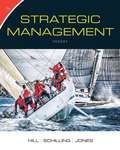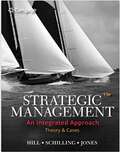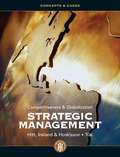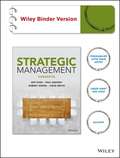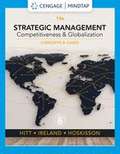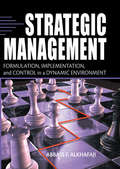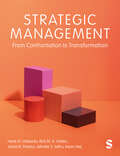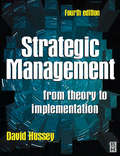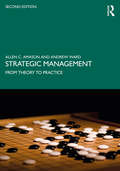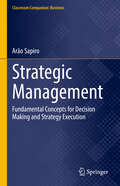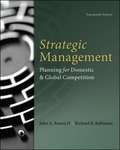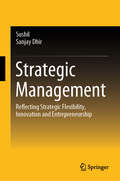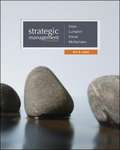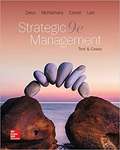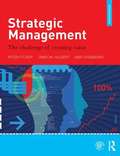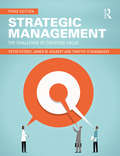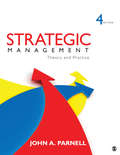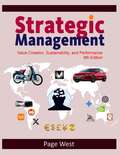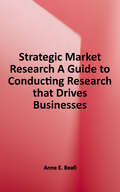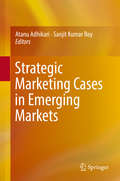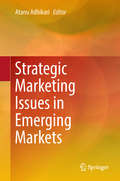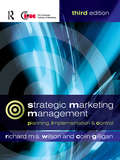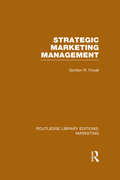- Table View
- List View
Strategic Management: An Integrated Approach
by Gareth R. Jones Charles W. L. Hill Melissa A. SchillingThis comprehensive and engaging text presents the complexities of strategic management through up-to-date scholarship and hands-on applications. Highly respected authors Hill, Schilling, and Jones integrate cutting-edge research on topics including competitive advantage, corporate governance, diversification, strategic leadership, technology and innovation, and corporate social responsibility through both theory and case studies. <p><p> Based on real-world practices and current thinking in the field, the 12th edition features an increased emphasis on the changing global economy and its role in strategic management. When paired with this student-centric text, the MindTap learning solution will prepare the next generation of strategic leaders.
Strategic Management: An Integrated Approach
by Gareth R. Jones Charles W. L. Hill Melissa A. SchillingMindTap for Hill/Schilling/Jones' Strategic Management: Theory & Cases, 13th helps you learn on your terms. INSTANT ACCESS IN YOUR POCKET. Take advantage of the MindTap Mobile App to learn on your terms. Read or listen to textbooks and study with the aid of instructor notifications, flashcards and practice quizzes. MINDTAP HELPS YOU CREATE YOUR OWN POTENTIAL. GEAR UP FOR ULTIMATE SUCCESS. Track your scores and stay motivated toward your goals. Whether you have more work to do or are ahead of the curve, you'll know where you need to focus your efforts. And the MindTap Green Dot will charge your confidence along the way. MINDTAP HELPS YOU OWN YOUR PROGRESS. MAKE YOUR TEXTBOOK YOURS. No one knows what works for you better than you. Highlight key text, add notes and create custom flashcards. When it's time to study, everything you've flagged or noted can be gathered into a guide you can organize.
Strategic Management: Competitiveness and Globalization (Tenth Edition)
by Michael A. Hitt R. Duane Ireland Robert E. HoskissonIntroduce strategic management using the market-leading text that sets the standard for the most complete, relevant presentation. Written by highly respected experts and prestigious scholars, Hitt/Ireland/Hoskisson's STRATEGIC MANAGEMENT: COMPETITIVENESS AND GLOBALIZATION, CONCEPTS AND CASES, 10E provides an intellectually rich, yet thoroughly practical analysis of strategic management today. This unique text is the only one to integrate the classic industrial organization model with a resource-based view of the firm to give readers a complete understanding of how today's businesses use strategic management to establish a sustained competitive advantage. The authors present cutting-edge research and strategic management trends within a strong global focus, using memorable examples from more than 600 companies. A wealth of learning features and selection of 30 all-new compelling cases prepare your students to face the broad range of critical issues confronting contemporary managers. Engaging video cases, CengageNOW online teaching tools, and a complete electronic business library keeps study current and relevant.
Strategic Management: Concepts
by Robert Jensen Jeffrey H. Dyer Paul Godfrey David Bryce W. Gibb DyerDesigned for the Strategic Management course, Strategic Management: Concepts and Tools for Creating Real World Strategy by Jeff Dyer, Paul Godfrey, Robert Jensen, and David Bryce will make your life easier. This text delivers an insightful and concise introduction to the concepts of strategy with a strong mix of professional applications drawing on the authors' personal experiences. Acting as consultants for your classroom, the authors developed this product in a manner that helps to spark ideas, fuel creative thinking and discussion, and introduce innovative learning technologies that aids students.
Strategic Management: Concepts and Cases: Competitiveness and Globalization
by Michael A. Hitt R. Duane Ireland Robert E. HoskissonExamine strategic management with the market-leading book that sets the standard as today's most intellectually rich, practical analysis of strategic management. Written by prominent management scholars and award-winning instructors. 13E incorporates cutting-edge research and new examples from more than 600 companies to reveal how firms effectively use the strategic management process. This edition combines a classic industrial organization model with a resource-based view of the firm to demonstrate how businesses establish competitive advantages and create value for stakeholders in the global marketplace. You study how firms govern themselves, the value of strategic alliances to global companies and the value firms create by melding strategic management and entrepreneurial behaviors when competing. Also included at no additional charge are 20 leading business cases, carefully selected by the authors, which cover several US and international businesses across many industries. With STRATEGIC MANAGEMENT you gain the insights and understanding you need to outperform competitors and excel as a strategic leader.
Strategic Management: Formulation, Implementation, and Control in a Dynamic Environment
by Abbass Alkhafaji Richard Alan NelsonAirborne Express, Hershey's, Motorola, Pillsbury-how do the executives of international corporations formulate effective strategies for corporate success? Filled with helpful insights into the state of the art in strategic management, this book provides a framework for the formulation, implementation, and control of strategies for all types of domestic and global organizations. You'll also find 21 suggested corporate cases for analysis (complete with reference sources), including Blockbuster Video, PepsiCo, Harley-Davidson, Nike, Home Depot, and Microsoft. This up-to-date volume gives you a comprehensive overview of strategic management in an easy-to-read format. It addresses important current issues, such as TQM (Total Quality Management), reengineering, benchmarking, and the formulation of strategic management in international markets. Strategic Management: Formulation, Implementation, and Control in a Dynamic Environment is a part of The Haworth Press, Inc. promotion book series edited by Richard Alan Nelson, Ph.D., APR. Here is a small sample of what Strategic Management: Formulation, Implementation, and Control in a Dynamic Environment will teach you about: the definition, meaning, and history of strategic management the difference between business policy and business strategy corporate structure, governance, and culture mission statements how to assess the corporate/business environment-internal, external, and macro how to formulate an effective business strategy strategic alternatives-specialization, diversification, alliances, joint ventures, acquisitions, and more dealing with foreign governments and competing on a global scale the role of the general manager and the board of directors the control process and ways to measure the financial soundness of strategic decisions management techniques for not-for-profit companies Strategic Management: Formulation, Implementation, and Control in a Dynamic Environment is an ideal reference for any teacher, student, or professional in the management arena.
Strategic Management: From Confrontation to Transformation
by Kevin Heij Henk W. Volberda Rick M. Hollen Joana R. Pereira Jatinder S. SidhuIn the quest for competitive advantage, navigating change can be daunting. Following a unique, four-part structure focussing on confronting strategic issues, sensing opportunities and threats, choosing strategies and transforming organizations, this essential textbook offers a fresh and provocative perspective on strategic management. Covering the latest theories and concepts and taking an action-oriented approach, the book includes: • Cutting-edge content on the confront-sense-choose-transform stages of strategic management such as purpose and sustainability, emerging technologies, ecosystems and platforms, and business model innovation • Four diagnostic chapters providing practical tools for each stage of the strategy process • Nearly 70 case studies of internationally recognisable companies like Airbnb, Ben & Jerry’s, Epic Games store, Hilton, Icebreaker, McDonald’s, Nestlé, Northvolt, Tesla and PayPay • ‘Key Debate’ boxes outlining opposing perspectives on hot topics in the strategy field and ‘Strategic Focus’ boxes digging deeper into contemporary phenomena Instructors can access a range of online resources, including a teaching guide complete with case study teaching notes, further reading and video links, PowerPoints and a bank of additional case studies. Suitable for undergraduate and postgraduate students of strategy, Strategic Management: From Confrontation to Transformation will help you grow your knowledge and experience of developing and implementing strategy in the real world. Henk W. Volberda is Professor of Strategy & Innovation at the Amsterdam Business School, University of Amsterdam. Rick M.A. Hollen is a Lecturer and Researcher at the Strategy & International Business section of the Amsterdam Business School, University of Amsterdam and a Managing Research Associate at the Amsterdam Centre for Business Innovation (ACBI). Joana R. Pereira is Lecturer in the Strategy and Organization group of Leeds University Business School, University of Leeds. Jatinder S. Sidhu is Professor and Chair in Strategic Management and Organization at Leeds University Business School, University of Leeds. Kevin Heij is Senior Researcher of the Amsterdam Centre for Business Innovation at the Amsterdam Business School, University of Amsterdam.
Strategic Management: From Confrontation to Transformation
by Kevin Heij Henk W. Volberda Rick M. Hollen Joana R. Pereira Jatinder S. SidhuIn the quest for competitive advantage, navigating change can be daunting. Following a unique, four-part structure focussing on confronting strategic issues, sensing opportunities and threats, choosing strategies and transforming organizations, this essential textbook offers a fresh and provocative perspective on strategic management. Covering the latest theories and concepts and taking an action-oriented approach, the book includes: • Cutting-edge content on the confront-sense-choose-transform stages of strategic management such as purpose and sustainability, emerging technologies, ecosystems and platforms, and business model innovation • Four diagnostic chapters providing practical tools for each stage of the strategy process • Nearly 70 case studies of internationally recognisable companies like Airbnb, Ben & Jerry’s, Epic Games store, Hilton, Icebreaker, McDonald’s, Nestlé, Northvolt, Tesla and PayPay • ‘Key Debate’ boxes outlining opposing perspectives on hot topics in the strategy field and ‘Strategic Focus’ boxes digging deeper into contemporary phenomena Instructors can access a range of online resources, including a teaching guide complete with case study teaching notes, further reading and video links, PowerPoints and a bank of additional case studies. Suitable for undergraduate and postgraduate students of strategy, Strategic Management: From Confrontation to Transformation will help you grow your knowledge and experience of developing and implementing strategy in the real world. Henk W. Volberda is Professor of Strategy & Innovation at the Amsterdam Business School, University of Amsterdam. Rick M.A. Hollen is a Lecturer and Researcher at the Strategy & International Business section of the Amsterdam Business School, University of Amsterdam and a Managing Research Associate at the Amsterdam Centre for Business Innovation (ACBI). Joana R. Pereira is Lecturer in the Strategy and Organization group of Leeds University Business School, University of Leeds. Jatinder S. Sidhu is Professor and Chair in Strategic Management and Organization at Leeds University Business School, University of Leeds. Kevin Heij is Senior Researcher of the Amsterdam Centre for Business Innovation at the Amsterdam Business School, University of Amsterdam.
Strategic Management: From Theory to Implementation
by David E. HusseyA major textbook on strategic management which not only deals fully with the theoretical aspects of corporate planning, but also provides practical guidance on implementation. Now completely revised and updated this book is particularly suitable for the student or manager who needs to relate strategic thinking to current practice. The format has been enlarged and the interior of the book re-designed. The fourth edition treats both analytical and behavioural aspects of planning in depth. Strategic analysis is covered in particular detail, with examples reporting proven - and often original - applications of these theories. Six major case studies have been added to illustrate the application of strategic management theory in practice and a chapter discusses the impact of new approaches to strategy. With comprehensive reference lists, and a guide to research resources, this volume will prove invaluable to researchers and advanced students as well as to the practising manager. A lecturer's resource is available on the BH website which contains a Powerpoint presentation, additional case studies and notes and exercises for seminar use. Details are available by emailing bhmarketing@repp.co.uk'a highly commendable piece of work, a true compendium for the practitioner and student of planning.' - Journal of Strategic Change (review of the third edition)
Strategic Management: From Theory to Practice
by Andrew Ward Allen C. AmasonA focus on creating and sustaining a flow of profitable transactions, in other words, the creation of sustainable competitive advantage is the seemingly simple, yet complex goal of strategic leaders and managers. Allen Amason and Andrew Ward approach the topic of strategic management with this focus in mind. Rather than simply teaching theory and research, Amason and Ward seek to convey the fundamental keys to how strategy works. This book is designed to help students think critically and understand fully how to strategically manage their future firms. In so doing, it will enable them to adapt and learn, even as their circumstances change; to apply sound logic and reasoning, even in new and unfamiliar settings. By conveying enduring and fundamental principles of economic and human behavior rather than simply reporting on the latest innovations, this book succeeds in preparing students to excel in the business environment over time, regardless of how it evolves.
Strategic Management: Fundamental Concepts for Decision Making and Strategy Execution (Classroom Companion: Business)
by Arão SapiroThis book provides students with the fundamental concepts and stages of strategic management and planning in organizations with essential tools to make decisions in order to remain competitive in the business world of today. It offers an introduction to the key topics and themes of organizational and competitive strategies and provides a panoramic view of the changing corporate environment. The author draws on insights from various typical functional courses, such as marketing, finance, and accounting, to help students understand how top executives and managers make the strategic decisions that drive successful businesses. Students learn how to conduct a case analysis, measure organizational performance, and conduct external and internal analyses. The book features learning objectives, glossaries, and real cases related to the content of each chapter. The book also features discussions on the execution and evaluation of organizational performance; environment,social, and governance (ESG); and decision and risk analysis. This book is useful for upper undergraduate and graduate level courses in strategic planning and management, business administration, decision making, and business strategy.
Strategic Management: Planning for Domestic & Global Competition, Fourteenth Edition
by John A. Pearce Richard B. RobinsonThe fourteenth edition of Strategic Management continues to increase the emphasis on planning for domestic and global competition in a global economy that is integral to strategic decision in even the smallest business or organisation on Main Street - in any town worldwide every day.
Strategic Management: Reflecting Strategic Flexibility, Innovation and Entrepreneurship
by Sushil Sanjay DhirThis book emphasizes the concepts of strategic innovation and entrepreneurship, which are quite prevalent in today's organizations. Going beyond traditional approach that follows strategic analysis, choice and implementation framework, and traditional theories based on industrial organization paradigm and resource-based view, the book considers current business environment, which is volatile, uncertain, complex, chaotic, conflicting, and ambiguous (VUCA). It takes the strategic flexibility view to cope with these strategic challenges. The book introduces the subject matter of strategic management in retrospect and prospect, highlighting critical theories of strategic management. It uses a strategic learning framework rather than a purely analytical approach to dynamically learn about the external situation, internal resources, and capabilities. The evolution of strategy is given in terms of generic strategies in practice and adaptation in specific contexts. It further deals with essential topics such as strategic alliances and networks, mergers and acquisitions, and global strategy. It then provides the execution framework and models covering restructuring, leadership, corporate governance, and change management. The strategy in specific areas such as strategic technology management, e-business and knowledge management, and functional strategies and policies are discussed to understand the implementation depth. Finally, it touches upon contemporary issues such as sustainable enterprise, stakeholder perspectives, and comparative strategies in various contexts. It then outlines future directions of strategic management. In the end, case analysis guidelines are provided with sample cases from different parts of the world. The book also used interpretive and simulation methods such as system dynamics and total interpretive structural modeling to grasp the relationships and their dynamic impact provided throughout the book. It will be an invaluable resource for researchers of business strategy as well as students studying these courses; it will also be useful for industry practitioners, corporates and business policy makers.
Strategic Management: Text And Cases
by Gregory Dess Alan Eisner G. T. Lumpkin Gerry McNamara<P>Strategic Management: Text and Cases, Seventh Edition, written by the well respected authors Dess/Lumpkin/Eisner/McNamara provide solid treatment of traditional topics in strategic management as well as thorough coverage of contemporary topics such intellectual assets, entrepreneurship, innovation, knowledge management, internet strategies, crowdsourcing, environmental sustainability. The accessible writing style and wealth of new and updated illustrations, which clarify the most difficult topics, make this title an excellent resource for your students. <P>The new case selections emphasise variety, currency, and familiar company names. The cases are up-to-date in terms of both financial data and strategic issues. This group of cases gives both instructors and students unparalleled quality and variety. Based on consistent reviewer feedback, these selections combine comprehensive and shorter length cases about well known companies.
Strategic Management: Text and Cases
by Gregory Dess Alan Eisner Gerry McNamara Seung-Hyun LeeStrategic Management: Text and Cases, Ninth edition, written by authors Dess, McNamara, Eisner, and Lee continues its tradition of being readable, relevant, and rigorous. Its engaging writing style minimizes jargon to maximize readability. It provides examples from management practice and societal themes including environmental sustainability, ethics, globalization, entrepreneurship, and data analytics to make the content relevant. It draws on the latest research by management scholars and insights from executives to balance accessibility with rigor.
Strategic Management: The Challenge of Creating Value
by Peter Fitzroy James M. Hulbert Abby GhobadianStudents trying to navigate the strategy jungle may lose sight of the fact that strategic management is about creating value in an organization. Understanding strategic management is a core part of all business qualifications and this textbook brings a new and easy-to-follow understanding of this vital business function. In addition to walking the student through the basics of the subject, the authors provide an array of analytical tools to help facilitate a thorough understanding of strategic management. The book addresses thoroughly the impact of financial markets on a firm's strategic capabilities, as well as looking at other challenging environmental factors. Aided by an array of student-friendly features, such as: learning objectives, 'strategic management in practice' case studies and review questions in each chapter, Strategic Management will help students to excel in their strategic management classes and better prepare them for the real business world. A comprehensive companion website, containing a wealth of supplementary materials for students and lecturers alike, is available at: http://www.routledge.com/cw/fitzroy.
Strategic Management: The Challenge of Creating Value
by Peter Fitzroy James M. Hulbert Timothy O'ShannassyStrategy is often the capstone class in a business education - dealing with the big questions of what companies decide to do - innovate, diversify, acquire or even to employ a range of these strategies. Benefitting from an international author team, the latest edition of this textbook stands out in its global perspective. With an emphasis on value creation, integration of financial considerations alongside coverage of areas that are often missed in competitor texts, such as financial implications for strategy, corporate governance and business ethics. The book also integrates a wide range of in-depth case studies, including Siemens AG, Intel, the Volkswagen Group, PerkinElmer and the Tata Group. Supplemented by a wide range of cutting edge online case studies and other internet resources, this text will provide students and their instructors with everything they need to succeed in this tough environment.
Strategic Management: Theory and Practice
by John A. ParnellIn Strategic Management: Theory and Practice, Fourth Edition, John A. Parnell leads readers through detailed, accessible coverage of the strategic management field. Concise and easy to understand chapters address concepts sequentially, from external and internal analysis to strategy formulation, strategy execution, and strategic control. Rather than relegating case analysis to a chapter at the end of the book, Parnell aligns each chapter's key concepts with 25 case analysis steps. Current examples and high interest real-time cases, largely drawn from The Wall Street Journal and Financial Times, illustrate the key role of strategic management in the United States and around the world.
Strategic Management: Value Creation, Sustainability, and Performance
by G. Page West IIIThis book combines theory and practice in a particularly effective approach to the study of strategic management. Emphasizing strategy development in highly competitive environments, it applies traditional theoretical principles and analytical frameworks to today's dynamic business climate. It uses value creation and resource-based sustainability as central concepts to integrate ideas from cover to cover. This enables a broad discussion of stakeholders and organizational goals, in-depth exploration of the foundation of superior long term performance, and shows how strategy content areas are all centrally related. The book is also distinguished by its very practical approach. Chapters provide guidance on actually putting strategy frameworks to use (e.g., steps to conduct an industry analysis, how to do a resource analysis, how to conduct a value chain analysis) along with examples of how to do so. Fresh material from the news brings the theory and the practice alive for students. Classroom-tested and peer-reviewed, the author employs an engaging writing style that appeals to students and instructors alike.
Strategic Management: Value Creation, Sustainability, and Performance
by Page WestStrategic Management 8e combines theory and practice, updated into 2024, in a unique and integrative approach to the study of strategic management. For instructors it emphasizes the value chain and resource-based sustainability as central integrating strategy concepts. For students it draws on the twin "strategic imperatives" of value creation and opportunity recognition as recurrent themes that help to sync ideas from cover to cover. Together these integrating mechanisms focus on the tension that exists between competing effectively in the present while preparing to compete effectively over the long run. Examples from highly competitive environments illustrate how traditional theoretical principles and analytical frameworks apply to today's dynamic business climate. Grounded in contemporary strategic management theory, the book also exhibits a very practical approach. An early chapter is devoted exclusively to the key question of Strategy and Performance, which enables richer classroom discussions moving forward. Other chapters provide step-by-step guidance on actually putting strategy frameworks to use (e.g., how to conduct an industry analysis, how to do a resource analysis, how to conduct a value chain analysis) along with clear examples for each. Classroom-tested and peer-reviewed, the author employs an engaging writing style that appeals to students and instructors alike. This 8th edition updates the previous edition and continues its tradition of providing the most current industry and company data of any strategy text in the market.
Strategic Market Research: A Guide to Conducting Research That Drives Businesses
by Anne E. BeallFor a company to embrace market research as a facilitator of change, it must be willing to take the approach that makes the most impact on its organization. In this guide, author Anne Beall shares her unique approach for conducting strategic market research. With more than 25 years of experience, Beall details the strategic principles she has developed that impact the way in which market research can inspire and change an organization. It all begins with the following steps: Identifying the strategic questions that will help a business; Using the right research techniques to answer these questions; Obtaining the level of depth required to have insight; Reading the nonverbal communications of research respondents; Identifying the emotional aspects of human behavior; Using statistical analyses to understand what drives markets; Going beyond the data to interpret the results and make strategic recommendations. In addition to addressing both qualitative and quantitative research, Strategic Market Research provides real-life examples illustrating the application of these concepts in various scenarios, including businesses and non-profit organizations.
Strategic Marketing Cases in Emerging Markets
by Sanjit Kumar Roy Atanu AdhikariThis is a teaching companion to the case studies provided in the book 'Strategic Marketing Cases in Emerging Markets' and is intended to help teachers and trainers follow a pedagogic line by using the case studies to develop a critical understanding of the service business scenarios and strategies for marketing in emerging markets. The authors provide extensive teaching notes for each of the cases, covering the pedagogy of the case study, the prerequisites to understanding it, case-specific teaching objectives, a suggested teaching approach, and a case synopsis. Each case is then rounded out with suggested discussion questions and concise answers, as well as additional reading to enhance the teaching and learning experience in the classroom.
Strategic Marketing Issues in Emerging Markets
by Atanu AdhikariThis book presents a collection of articles addressing a range of marketing strategies unique to emerging economies. It describes the component of strategic and tactical marketing, including the marketing mix, segments and targeting, product and market orientation, employing the Internet and social media, penetration and loyalty strategies and innovation, and other strategy issues in the marketing context. In addition, the book focuses on creating, communicating, and delivering customer value to emerging market consumers through diverse marketing strategies, processes, and programs in the context of emerging markets’ dynamics, consumer diversity, and competitors. Bringing together contributors from industry and academia to explore key marketing issues prevalent in India and other emerging economies, the book offers a unique and insightful read for a global audience."This book, edited by Dr. Atanu Adhikari, offers important analytical and managerial insights into consumer behavior, firm strategy, market dynamics and marketing instruments (price, promotion, distribution and product). While marketing and management disciplines have developed useful empirical generalizations, the context is critical. This book does exactly that -- place the generalized results in the context of emerging markets and India. Accordingly, this is a valuable resource for scholars and practitioners." -- Dr. Gurumurthy Kalyanaram, Professor, City University of New York, USA and Tata Institute of Social Sciences, Mumbai, India; US Editor, International Journal of Learning and Change; and President, MIT South Asian Alumni Association"This book is a must-read for anyone interested in marketing to less-developed countries. While the focus of the chapters is on India, the lessons learned can be generally applied. The 32 chapters represent comprehensive coverage of nearly every topic related to marketing with many examples. Any manager interested in doing business in emerging markets, Professors who want a better knowledge of these markets, or students who want an excellent reference should acquire this book." -- Dr. Russell S. Winer, William Joyce Professor of Marketing, Stern School of Business, New York University, USA
Strategic Marketing Management
by Colin Gilligan Richard M.S. WilsonThis third edition of Strategic Marketing Management confirms it as the classic textbook on the subject. Its step- by- step approach provides comprehensive coverage of the five key strategic stages: * Where are we now? - Strategic and marketing analysis * Where do we want to be? - Strategic direction and strategy formulation * How might we get there? - Strategic choice * Which way is best? - Strategic evaluation * How can we ensure arrival? - Strategic implementation and control This new revised and updated third edition has completely new chapters on 'The Nature and Role of Competitive Advantage' and 'The Strategic Management of the Expanded Marketing Mix', and extensive new material covering: * The changing role of marketing * Approaches to analysing marketing capability * E-marketing * Branding * Customer relationship management * Relationship management myopia * The decline of loyalty The book retains the key features that make it essential reading for all those studying the management of marketing - a strong emphasis on implementation, up to date mini cases, and questions and summaries in each chapter to reinforce key points. Widely known as the most authoritative, successful and influential text in the sector, the new edition remains an irreplaceable resource for undergraduate and graduate students of business and marketing, and students of the CIM Diploma.
Strategic Marketing Management (Routledge Library Editions: Marketing)
by Gordon FoxallThis book considers marketing management within the overall corporate system of business policy-making, strategic planning and the implementation and control of effective plans. The information requirements of marketing management are highlighted and the marketing information system concept is developed within the framework of managerial information systems. In the chapters which deal with the elements of the marketing ‘mix’, the interrelated nature of these variables is emphasized. The book illustrates how the successful marketing manager can master each ‘weapon’ in the marketing ‘armoury’ and how (s)he can integrate those weapons to achieve the right mix for each product. The accent on integrated marketing continues in the final section where differentiated marketing is presented as an integrative framework and where the systematic control of marketing operations is described. This book is for students who will one day be managers: its emphasis is therefore on what is possible in marketing management and the most effective means by which marketing objectives can be attained.
